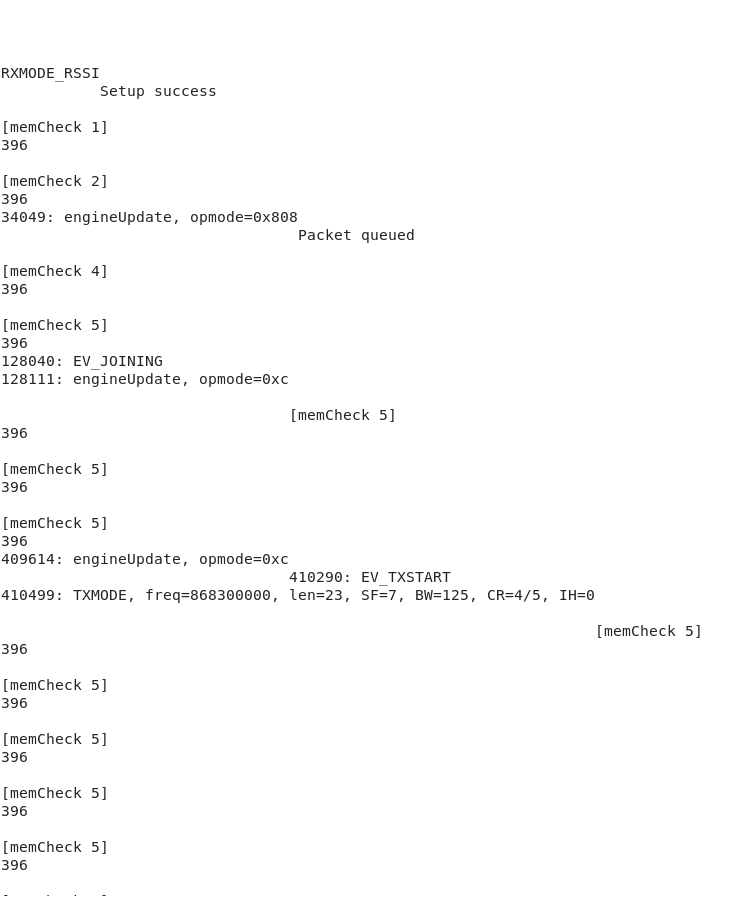avr-size returns the following:
$ avr-size -C --mcu=atmega328p .pio/build/ATmega328PB/firmware.elf
AVR Memory Usage
----------------
Device: atmega328p
Program: 25814 bytes (78.8% Full)
(.text + .data + .bootloader)
Data: 1639 bytes (80.0% Full)
(.data + .bss + .noinit)
$ avr-size .pio/build/ATmega328PB/firmware.hex
text data bss dec hex filename
0 25814 0 25814 64d6 .pio/build/ATmega328PB/firmware.hex
There is enough FLASH and SRAM left.
What other sorts of memory should I consider?
Unfortunately I still don’t have access to the gateway.
However I can share my ttn console logs:
(logs in chronologically reversed order)
Successfully processed join request:
{
"name": "ns.up.join.process",
"time": "2023-12-06T12:24:00.770148783Z",
"identifiers": [
{
"device_ids": {
"device_id": "eui-70b3d57ed00632b2",
"application_ids": {
"application_id": "rtls-test"
},
"dev_eui": "70B3D57ED00632B2",
"join_eui": "E23FB917CE9F837E"
}
}
],
"data": {
"@type": "type.googleapis.com/ttn.lorawan.v3.UplinkMessage",
"raw_payload": "AH6Dn84XuT/isjIG0H7Vs3AhG1gVUDI=",
"payload": {
"m_hdr": {},
"mic": "WBVQMg==",
"join_request_payload": {
"join_eui": "E23FB917CE9F837E",
"dev_eui": "70B3D57ED00632B2",
"dev_nonce": "1B21"
}
},
"settings": {
"data_rate": {
"lora": {
"bandwidth": 125000,
"spreading_factor": 7,
"coding_rate": "4/5"
}
},
"frequency": "868300000",
"timestamp": 3339768355,
"time": "2023-12-06T12:24:00.534013Z"
},
"rx_metadata": [
{
"gateway_ids": {
"gateway_id": "tgmdragino",
"eui": "A84041218E244150"
},
"time": "2023-12-06T12:24:00.534013Z",
"timestamp": 3339768355,
"rssi": -114,
"channel_rssi": -114,
"snr": 0.2,
"location": {
"latitude": 48.23655082230167,
"longitude": 16.369894444942478,
"altitude": 190,
"source": "SOURCE_REGISTRY"
},
"uplink_token": "ChgKFgoKdGdtZHJhZ2lubxIIqEBBIY4kQVAQo6TDuAwaDAjgz8GrBhDBpr6MAiC4sdPNmcMK",
"channel_index": 1,
"received_at": "2023-12-06T12:24:00.563057473Z"
}
],
"received_at": "2023-12-06T12:24:00.564475457Z",
"correlation_ids": [
"gs:uplink:01HGZHBH9K2D9GCEE6FRM7SSC0"
],
"device_channel_index": 1,
"consumed_airtime": "0.061696s"
},
"correlation_ids": [
"gs:uplink:01HGZHBH9K2D9GCEE6FRM7SSC0"
],
"origin": "ip-10-100-6-248.eu-west-1.compute.internal",
"context": {
"tenant-id": "CgN0dG4="
},
"visibility": {
"rights": [
"RIGHT_APPLICATION_TRAFFIC_READ"
]
},
"unique_id": "01HGZHBHG2QMEAA44X99D8C7RK"
}
Join-request to cluster-local Join Server succeeded
{
"name": "ns.up.join.cluster.success",
"time": "2023-12-06T12:24:00.580952626Z",
"identifiers": [
{
"device_ids": {
"device_id": "eui-70b3d57ed00632b2",
"application_ids": {
"application_id": "rtls-test"
},
"dev_eui": "70B3D57ED00632B2",
"join_eui": "E23FB917CE9F837E"
}
}
],
"data": {
"@type": "type.googleapis.com/ttn.lorawan.v3.JoinResponse",
"raw_payload": "IMo54mYdg8phZPkBv5ROJbBCTGy94giSgquK+mHooODI",
"session_keys": {
"session_key_id": "AYw/FcU7Lyi0Gj98+fs9TA=="
}
},
"correlation_ids": [
"gs:uplink:01HGZHBH9K2D9GCEE6FRM7SSC0"
],
"origin": "ip-10-100-6-248.eu-west-1.compute.internal",
"context": {
"tenant-id": "CgN0dG4="
},
"visibility": {
"rights": [
"RIGHT_APPLICATION_TRAFFIC_READ"
]
},
"unique_id": "01HGZHBHA4NV0CN9FSQX5E8Z1K"
}
Join Accept
{
"name": "js.join.accept",
"time": "2023-12-06T12:24:00.580584992Z",
"identifiers": [
{
"device_ids": {
"device_id": "eui-70b3d57ed00632b2",
"application_ids": {
"application_id": "rtls-test"
},
"dev_eui": "70B3D57ED00632B2",
"join_eui": "E23FB917CE9F837E",
"dev_addr": "260B435E"
}
}
],
"origin": "ip-10-100-7-232.eu-west-1.compute.internal",
"context": {
"tenant-id": "CgN0dG4="
},
"visibility": {
"rights": [
"RIGHT_APPLICATION_TRAFFIC_READ"
]
},
"unique_id": "01HGZHBHA4CKD6TPS0TJEQCXAM"
}
Send join-request to cluster-local Join Server
{
"name": "ns.up.join.cluster.attempt",
"time": "2023-12-06T12:24:00.567025860Z",
"identifiers": [
{
"device_ids": {
"device_id": "eui-70b3d57ed00632b2",
"application_ids": {
"application_id": "rtls-test"
},
"dev_eui": "70B3D57ED00632B2",
"join_eui": "E23FB917CE9F837E"
}
}
],
"data": {
"@type": "type.googleapis.com/ttn.lorawan.v3.JoinRequest",
"raw_payload": "AH6Dn84XuT/isjIG0H7Vs3AhG1gVUDI=",
"payload": {
"m_hdr": {},
"mic": "WBVQMg==",
"join_request_payload": {
"join_eui": "E23FB917CE9F837E",
"dev_eui": "70B3D57ED00632B2",
"dev_nonce": "1B21"
}
},
"dev_addr": "260B435E",
"selected_mac_version": "MAC_V1_0_3",
"net_id": "000013",
"downlink_settings": {
"rx2_dr": 3
},
"rx_delay": 5,
"cf_list": {
"freq": [
8671000,
8673000,
8675000,
8677000,
8679000
]
},
"correlation_ids": [
"gs:uplink:01HGZHBH9K2D9GCEE6FRM7SSC0"
],
"consumed_airtime": "0.061696s"
},
"correlation_ids": [
"gs:uplink:01HGZHBH9K2D9GCEE6FRM7SSC0"
],
"origin": "ip-10-100-6-248.eu-west-1.compute.internal",
"context": {
"tenant-id": "CgN0dG4="
},
"visibility": {
"rights": [
"RIGHT_APPLICATION_TRAFFIC_READ"
]
},
"unique_id": "01HGZHBH9QB2CMQ78BY8D8G30Q"
}
Receive join-request
{
"name": "ns.up.join.receive",
"time": "2023-12-06T12:24:00.566990750Z",
"identifiers": [
{
"device_ids": {
"device_id": "eui-70b3d57ed00632b2",
"application_ids": {
"application_id": "rtls-test"
},
"dev_eui": "70B3D57ED00632B2",
"join_eui": "E23FB917CE9F837E"
}
}
],
"data": {
"@type": "type.googleapis.com/ttn.lorawan.v3.UplinkMessage",
"raw_payload": "AH6Dn84XuT/isjIG0H7Vs3AhG1gVUDI=",
"payload": {
"m_hdr": {},
"mic": "WBVQMg==",
"join_request_payload": {
"join_eui": "E23FB917CE9F837E",
"dev_eui": "70B3D57ED00632B2",
"dev_nonce": "1B21"
}
},
"settings": {
"data_rate": {
"lora": {
"bandwidth": 125000,
"spreading_factor": 7,
"coding_rate": "4/5"
}
},
"frequency": "868300000",
"timestamp": 3339768355,
"time": "2023-12-06T12:24:00.534013Z"
},
"rx_metadata": [
{
"gateway_ids": {
"gateway_id": "tgmdragino",
"eui": "A84041218E244150"
},
"time": "2023-12-06T12:24:00.534013Z",
"timestamp": 3339768355,
"rssi": -114,
"channel_rssi": -114,
"snr": 0.2,
"location": {
"latitude": 48.23655082230167,
"longitude": 16.369894444942478,
"altitude": 190,
"source": "SOURCE_REGISTRY"
},
"uplink_token": "ChgKFgoKdGdtZHJhZ2lubxIIqEBBIY4kQVAQo6TDuAwaDAjgz8GrBhDBpr6MAiC4sdPNmcMK",
"channel_index": 1,
"received_at": "2023-12-06T12:24:00.563057473Z"
}
],
"received_at": "2023-12-06T12:24:00.564475457Z",
"correlation_ids": [
"gs:uplink:01HGZHBH9K2D9GCEE6FRM7SSC0"
],
"device_channel_index": 1,
"consumed_airtime": "0.061696s"
},
"correlation_ids": [
"gs:uplink:01HGZHBH9K2D9GCEE6FRM7SSC0"
],
"origin": "ip-10-100-6-248.eu-west-1.compute.internal",
"context": {
"tenant-id": "CgN0dG4="
},
"visibility": {
"rights": [
"RIGHT_APPLICATION_TRAFFIC_READ"
]
},
"unique_id": "01HGZHBH9PEKVKSAXYNRX6Z3GH"
},
{
"time": "2023-12-06T12:23:34.952Z",
"name": "synthetic.status.cleared",
"isError": false,
"isSynthetic": true,
"unique_id": "synthetic.1701865414952"
}
]
When I compared my logs to those of other forum members I discovered, that in my logs, there is no “Successfully scheduled join accept for transmission” after “Successfully processed join request”.
I assume it is the join-accept response, that should be scheduled, if everything works correctly, right?
So either I am not sending the right data so the join-accept response can’t be scheduled or the issue lies somewhere else…


